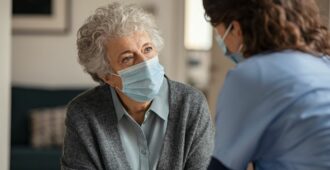
Australian researchers have begun work on a genomics project that will use saliva collected from 45 and Up Study participants to find the best way to detect common cancers.
The Australian Cancer Risk Study is a national collaborative program led by Dr Julia Steinberg and Professor Anne Cust at The Daffodil Centre, a joint venture between Cancer Council NSW and the University of Sydney. It aims to improve the risk-prediction, and detection, of four common cancers: breast, prostate and colorectal cancers as well as melanoma. Together, these cancers affect 80,000 Australians each year.
The project, which was awarded a $3 million grant in 2021 as part of the Genomics Health Futures Mission, involves genomic sequencing of 10,000 biological samples from 45 and Up Study participants.
“Our research aims to tailor early detection based on an individual’s risk of cancer,” says Dr Julia Steinberg, Genomics and Precision Health Stream Lead at the Daffodil Centre. “For example, someone with a higher risk of one of these cancers might benefit from being tested for cancer earlier or more often.”
DNA from saliva plays a vital role
The team have recently contacted a pilot group of 2400 participants from the 45 and Up Study about donating their saliva, and plan to contact 20,000 more participants in the coming months. Dr Steinberg says the response rate has been encouraging and she’s grateful to the hundreds of participants who have already signed up.
“The help of 45 and Up Study participants will be crucial to save the lives of Australians in the future.”
Researchers will analyse the DNA of saliva samples for links between genetic factors and cancer risk over time. “There are thousands of genetic variants that each increase our risk of cancer just a little bit,” says Dr Steinberg. The Australian Cancer Risk Study will use this genetic information to develop risk prediction tools that are tailored for Australians, Dr Steinberg says. “There are a lot of exciting options that we didn’t think possible a decade or two ago. This work will help the broader Australian Cancer Risk Study program to produce evidence-based recommendations for whether and how genomics can support effective and sustainable risk-tailored cancer screening and early detection.”
The research related to the 45 and Up Study is being done collaboratively with multiple partners, including teams from QIMR Berghofer Institute, who will extract DNA from each saliva sample, and the Centre for Population Genomics, who will assist in the analysis of large-scale genomic data sets.





